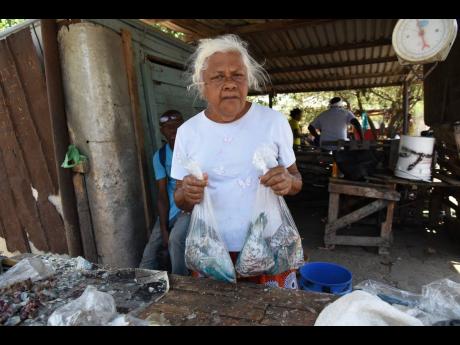EASTER PAIN
Fishers blame pollution, climate change for plummeting catch as customers dwindle
On Good Friday, fishermen in the Rae Town Fishing village tried to outsmart each other in a game of Chinese checkers. Usually, they would be busy offloading the morning’s catch and selling to the nearby vendors to satisfy the customary increased...
On Good Friday, fishermen in the Rae Town Fishing village tried to outsmart each other in a game of Chinese checkers.
Usually, they would be busy offloading the morning’s catch and selling to the nearby vendors to satisfy the customary increased demand for fish during the Easter season.
But in recent years, the demand has been falling even as they pull in smaller catches, with some fishers telling The Gleaner that this year is the worst they have seen.
“When it come to Easter, it come in like the fish dem feel the crisis, man,” 64-year-old fisherman Errol Evans said.
This “crisis”, Evans explained, has been brought on by a double whammy of climate change and pollution, which he said has been affecting fish stocks.
“Mi haffi go farther. Mi haffi do all five, six, seven, eight drop fi ketch one load a fish. Because of the climate, the fish dem normally come down fi di Easter; yuh nuh find it no more,” he said.
Evans, who has been fishing for more than four decades, said that heavy winds over the past few months have made the sea unusually rough. At times, he cannot venture out. In recent weeks, he has been catching as little as 40 pounds of snapper per week – a far cry from the regular 100 to 200 pounds he would haul in before the pandemic.
Within the last two years, he has not seen that size catch.
“If 20 people come, 10 people get fish,” he said, noting that not all fish vendors are able to get the amounts they would want from the fishermen.
A similar concern was shared by Richard Campbell, a fisherman of 25 years.
“When it (sea) extra rough, mi can’t go out there, and for a couple a years now, the climate change bring it. We normally woulda experience calm before Easter, [but] we nuh get none,” he said.
Campbell also expressed his displeasure at the pollution of the sea, which he believes is affecting his catch. And while he supports initiatives to address marine litter, he contends that it should be everyone’s responsibility.
“[Proper] disposal still nuh work out because of the people dem and how dem mentally stay. The solid waste people dem alone cannot do it,” he said.
Over at the Greenwich Town Fishing Village, Ato Sinclair had just finished offloading his catch of sprat. He said it is a favourite for the season, but he is not able to meet the demand this year.
“You have climate change weh a change up everything. It a cause di biggest changes inna di fishing to me overall. One time, dem time a year yah, whole heap a sprat! Yuh nah see dat again,” he said.
The fisherman told The Gleaner that the changes in the weather patterns have caused the destruction of coral reefs and an increasing unpredictability of the sea.
He said that he feels helpless, watching his livelihood of more than 20 years diminishing.
“We just haffi live inna it. [Same] like COVID, we haffi live inna it. Wi can’t do nothing,” he lamented.
The Government has allocated $313-million in the 2023-2024 Budget to promote climate resilience in fishing and aquaculture communities.
Initiatives will involve the development of a webpage for an awareness and behavioural change campaign, development of a fisheries information management system, and the implementation of subprojects.
The scarcity of some fish is affecting the prices, and president of the Greenwich Town Fishing Village, Novelette Mighty, said sales are down because of this.
“Fish sales deplete a lot. The sales that we are looking forward to, we don’t see dem. The sales were much better in COVID time,” she said, referring to 2020 and 2021 in the heights of the pandemic, which were characterised by curfews and lockdowns.
Mighty added that fish prices range between $400 and $1,500 per pound.
Lorna Williams, a fish vendor at the Greenwich Farm Fishing Village for more than 50 years, agreed that the increased cost could be deterring customers.
“The fish expensive, the fish scarce … . The sale nuh suh heavy like one time,” she said.
Williams told The Gleaner that she sold about 70 pounds of fish for the week, with sprat – the cheapest of the lot – attracting the most buyers. The 69-year-old fears the tradition of eating fish during Easter is dying.
“But people still come and buy. Dem buy dem two pound, three pound,” she said.



